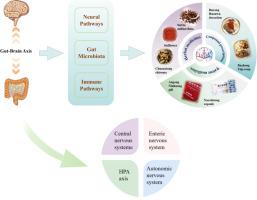Pathogenic mechanisms of cerebral ischemia and potential gut-brain axis-oriented therapeutic strategies
IF 8.3
1区 医学
Q1 CHEMISTRY, MEDICINAL
引用次数: 0
Abstract
Background
Cerebral ischemia is a serious cerebrovascular disease, and its pathogenesis is complex and involves a variety of pathological processes. In recent years, the theory of gut-brain axis has provided a new research perspective to reveal the synergistic pathological changes between brain and gut during cerebral ischemia. According to this theory, there is a bidirectional regulation mechanism between the central nervous system and gut microbiota, and the gut-brain axis plays a pivotal role in the occurrence and progression of cerebral ischemia. Therefore, drug intervention strategies based on gut-brain axis have gradually attracted attention. Existing studies have shown that, Chinese herbal medicines, compound prescriptions and Chinese patent medicines, can play potential therapeutic effects on cerebral ischemia by regulating intestinal flora, reducing neuroinflammation and oxidative stress. Despite the continuous progress of related research in recent years, the understanding of the role of gut-brain axis in cerebral ischemia is still patchy and lack of systematic summary.
Purpose
This article reviews the pathogenesis of cerebral ischemia regulated by the gut-brain axis and frontier drug intervention research based on this theory, in order to provide reference for follow-up research and clinical practice.

脑缺血的致病机制和潜在的肠-脑轴导向治疗策略。
背景:脑缺血是一种严重的脑血管疾病,其发病机制复杂,涉及多种病理过程。近年来,肠-脑轴理论为揭示脑缺血时脑-肠协同病理变化提供了新的研究视角。根据该理论,中枢神经系统与肠道菌群之间存在双向调节机制,肠脑轴在脑缺血的发生和发展中起关键作用。因此,基于肠脑轴的药物干预策略逐渐受到关注。已有研究表明,中草药、复方和中成药可通过调节肠道菌群、减轻神经炎症和氧化应激,对脑缺血发挥潜在的治疗作用。尽管近年来相关研究不断取得进展,但对肠脑轴在脑缺血中的作用的认识仍不完整,缺乏系统的总结。目的:综述脑肠轴调控脑缺血的发病机制及基于该理论的前沿药物干预研究,以期为后续研究和临床实践提供参考。
本文章由计算机程序翻译,如有差异,请以英文原文为准。
求助全文
约1分钟内获得全文
求助全文
来源期刊

Phytomedicine
医学-药学
CiteScore
10.30
自引率
5.10%
发文量
670
审稿时长
91 days
期刊介绍:
Phytomedicine is a therapy-oriented journal that publishes innovative studies on the efficacy, safety, quality, and mechanisms of action of specified plant extracts, phytopharmaceuticals, and their isolated constituents. This includes clinical, pharmacological, pharmacokinetic, and toxicological studies of herbal medicinal products, preparations, and purified compounds with defined and consistent quality, ensuring reproducible pharmacological activity. Founded in 1994, Phytomedicine aims to focus and stimulate research in this field and establish internationally accepted scientific standards for pharmacological studies, proof of clinical efficacy, and safety of phytomedicines.
 求助内容:
求助内容: 应助结果提醒方式:
应助结果提醒方式:


